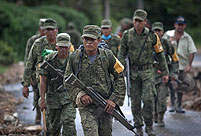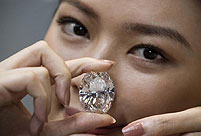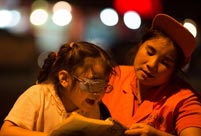The traditional Mid-Autumn Festival in China has been reduced in recent years to a networking opportunity, but this year, the national corruption crackdown has brought back some of the festival's original flavor.
With the high value they put on social relations and contacts, Chinese people see holidays the proper time to nurture bonds with friends, as well as cozying up to government officials.
Mooncake is the center piece of the table at the Mid-Autumn Festival which falls on Sept. 19 this year, but with increasingly exquisite packing and luxury stuffing like shark fin, they have become less of a food and more of a tool to bribe officials or business partners.
Gift cards and luxury banquets, to name but two, have played a similar roles.
The pricey delicacy with its lavish extras has fallen from favor this year and sales of expensive mooncakes dropped dramatically.
Chaoshifa, a major supermarket chain in Beijing, recorded a drastic 60 percent-decline year-on-year in group buying of packaged mooncake by companies, government agencies or other organizations, figures released by the Beijing Municipal Commission of Commerce showed. Personal consumption accounted for 80 percent of the chain's mooncake sales.
Production of luxury autumn gift sets which can include mooncake, hairy crab and premium wine, was reduced by half or even more in south China's Guangxi Zhuang Autonomous Region, said He Yikui, deputy head of the region's cooking and catering association.
The unpopularity of luxury mooncake followed a meeting of the Communist Party of China Central Commission for Discipline Inspection in August.
Practices like giving gifts or holding banquets using public funds around festivals, such as the forthcoming Mid-Autumn Festival, must be restrained, said the statement after the meeting.
Sharp decreases have also been seen in costly banquets held in upmarket restaurants and hotels during the holiday from Sept. 19 to 21, while family gatherings in ordinary restaurants have become more popular.
Xiang'e Flavor, a nationwide restaurant chain, suffered an 80 percent reduction in business banquets this holiday, according to figures from the Beijing Municipal Commission of Commerce.
Like many traditional occasions in China, the Mid-Autumn Festival is more about spiritual expressions than eating and exchanging gifts, said Feng Jicai, a well-known Chinese writer and vice chair of China Federation of Literary and Art Circles.
"The crackdown on extravagance and corruption has helped people find their way back to traditions," Feng said.
 Storms leave 97 dead, 58 missing in Mexico
Storms leave 97 dead, 58 missing in Mexico New model of indigenous surface-to-air missiles testfired
New model of indigenous surface-to-air missiles testfired  118.28-carat diamond to be auctioned in HK
118.28-carat diamond to be auctioned in HK Maternal love under streetlight
Maternal love under streetlight Naked foreign student sits in the middle of a road in Haikou
Naked foreign student sits in the middle of a road in Haikou  Colorful Yunnan: Enjoy the natural beauty
Colorful Yunnan: Enjoy the natural beauty Harbin named Chinese city with most beautiful women
Harbin named Chinese city with most beautiful women New college students' military training in Guangzhou
New college students' military training in Guangzhou Rugby girls
Rugby girls PLA's 38th Group Army conduct training
PLA's 38th Group Army conduct training Residences of the royal house of Savoy
Residences of the royal house of Savoy The last days of Wan Aihua
The last days of Wan Aihua Highlights at 12th National Games of China
Highlights at 12th National Games of China Beijing Film Academy welcomes freshmen
Beijing Film Academy welcomes freshmen Large mahjong party sets new world record
Large mahjong party sets new world recordDay|Week|Month